
IHG Hotels & Resorts, one of the world’s leading hospitality companies, is proud to announce the signing of three hotels in Thailand with long-standing partner Asset World Corporation (AWC), the country’s leading integrated lifestyle real-estate group. The multi-property agreement includes the new-build InterContinental Bangkok Chinatown – the first luxury hospitality development in the area – and two further projects in Chinatown and Pattaya, totalling 629 rooms. Rajit Sukumaran, Managing Director, South East Asia & Korea, IHG, said: “We’re excited to work with our long-standing partner Asset World Corporation to unveil these three outstanding properties across Bangkok and Pattaya. Together, they will provide an extraordinary luxury hospitality, retail and lifestyle experience for our guests. “InterContinental Bangkok Chinatown will be our third InterContinental hotel in Bangkok, and is the perfect choice for Verngnakornkhasem, one of the oldest neighbourhoods in the city. Meanwhile, we’re in advanced discussion with AWC regarding the brand positioning of the other two properties in our agreement, in Bangkok and Pattaya. “We plan to double our portfolio in Thailand in the next three to five years and these signings represent the strong growth momentum of IHG in Thailand and South East Asia. We look forward to working closely with AWC to expand their diverse hospitality and lifestyle offerings and bring our IHG family of brands to city and resort destinations throughout this wonderful country.” Wallapa Traisorat, Chief Executive Officer and President, Asset World Corporation (Plc), AWC, added: “AWC remains confident Thailand’s tourism industry has a strong future and will continue with its investments. “The expansion of our cooperation with IHG further diversifies our hospitality portfolio and allows us to deliver even more impressive experiences while meeting a wider array of customer demands, in turn bolstering the potential of Thailand’s tourism sector to expand its customer base. It will also deliver experiences that will attract tourists from across the globe who emphasise selection and international service standards.” “We’re delighted to partner with IHG Hotels & Resorts, who share our vision of bringing world-class destination concepts to Thailand. Signing an agreement with a world-class partner coincides with our quality development plan and we share a vision towards creating a better future through sustainable growth. This collaboration also reaffirms our dedication to playing a part in enhancing Thailand’s tourism competitiveness. Our projects will feature distinct architectural designs as well as impressive experiences while also generating value for their surrounding communities, society and the environment,” Wallapa further stated. “As the first luxury hospitality development in Chinatown, InterContinental Bangkok Chinatown is sure to instantly become an iconic landmark in Bangkok, while our other hotel in Chinatown will elevate the mixed used development project, and offer a fantastic lifestyle experience to our guests.” Set to open in 2027, the 332-room InterContinental Bangkok Chinatown hotel will be located within a vibrant mixed-use development in historic Verngnakornkhasem. It will feature two hotels, residences and a retail mall, including a 24-hour food centre on Charoen Krung Road. Combining the brand’s world-renowned reputation with the wonders of local culture, the hotel will feature three restaurants and bars, as well as a swimming pool, fitness centre and a vast 1,400 square metres of events and meeting space supplemented by eight private rooms. The mixed-use development will also boast the second property under this agreement – a 63-room lifestyle boutique hotel, converted from traditional four-storey shophouses to provide a stylish and authentic stay for visitors to the “Heritage of Asia City” Visitors will be spoilt for choice as they enjoy the biggest array of underground retail outlets in Bangkok, a heritage walk and an entertainment boulevard with space for festive celebrations and cultural performances. A new historical and cultural attraction – “The Golden Pagoda” – is under commission, as well as the construction of an entrance gate to welcome people into the history and culture inspiring destination. A short drive to Suvarnabhumi International Airport, the development is located close to popular tourist attractions including the Grand Palace, the shopping district, Sathorn and Silom. It will form part of the transformation of Verngnakornkhasem and ensure its status as a “must-visit” destination. Another boutique hotel under the agreement – will open in Pattaya in early 2024. Located within the Aquatique district, Pattaya’s first iconic lifestyle destination, it will be at the heart of a major lifestyle and entertainment complex featuring hotels, retail and dining outlets, and convention spaces. With 234 rooms and suites, the hotel will also feature restaurants, a rooftop bar, a swimming pool, spa and meeting rooms in excess of 670 square metres. The triple signing is part of a long-standing partnership between IHG and AWC to manage a portfolio of properties offering more than 1,200 rooms across Thailand, including the 306-room InterContinental Chiang Mai Mae Ping Hotel that will open in 2022. IHG and AWC are also exploring opportunities for the Kimpton brand, a design-led luxury boutique hotel with award-winning restaurants and bars, and heartfelt service in leading resort destinations within Thailand. Thailand continues to be a strong growth market for IHG, with 32 hotels across eight brands in the country and another 33 properties in the pipeline.The new signings are part of the company’s aim to grow its Luxury and Lifestyle portfolio in Thailand by 50%, as well as its estate, across all of its brands, in the country.
Create: Jun 23, 2021 Edit: Jun 23, 2021 International News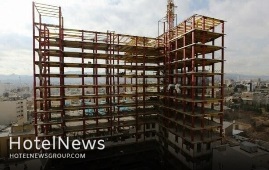
Upon their completion in the near future, these hotels will bring a significant change to the tourism industry in the central Iranian province, the provincial tourism chief has said. The official briefed on one of the accommodation projects, as an example, saying: “An investment of 2.6 trillion rials (about $62 million at the official exchange rate of 42,000 rials per dollar) has been made in the Zaferanieh Hotel, one of the under-construction projects,” the official added. “Covering an area of 1,500 square meters, the project is expected to generate 80 job opportunities directly,” he stated. “The hotel will have 90 rooms and will add 200 beds to the hospitality sector of the province,” he noted. The second-holiest city of the country after Mashhad, Qom is home to both the magnificent shrine of Hazrat-e Masumeh (SA) and the major religious madrasas (schools). Apart from sightseers and pilgrims who visit Qom to pay homage at the holy shrine, the city is also a top destination for Shiite scholars and students who come from across the world to learn Islamic studies at its madrasas and browse through eminent religious bookshops. The antiquity of Qom goes back to the Sassanid era (224 CE–651) and several historical mosques, mansions, and natural sceneries have been scattered across the city as well as towns and villages nearby.
Create: Jun 23, 2021 Edit: Jun 23, 2021 Regional News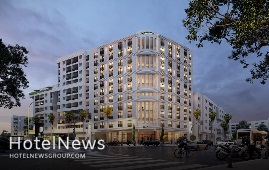
Radisson Hotel Group is proud to announce the debut of its second brand and third hotel in Morocco with the signing of Radisson Hotel Casablanca Gauthier La Citadelle in partnership with Al Hoceinia Hospitality. With construction already underway, the hotel is scheduled to open in 2023 and will consist of 133 guestrooms and suites. Located in the heart of Casablanca’s vibrant and exclusive Gauthier district, one of the prominent corporate, financial and entertainment districts, Radisson Hotel Casablanca Gauthier La Citadelle is just 2.5 km from the glistening La Corniche, the charming Old Medina, and Hassan II Mosque, the second largest mosque in the world. The hotel will offer a unique view over the Arab League Park and will also form part of La Citadelle, a new, premium mixed-use development which will comprise of residences, offices and retail outlets. Ramsay Rankoussi, Vice President, Development, Africa & Turkey, Radisson Hotel Group, said, “Morocco is a strategic bridge between Europe and the rest of Africa, and a key focus market in our African development strategy. We aim to grow our Moroccan portfolio to over 15 hotels within the next three to five years, and Casablanca is a key city where we are looking to expand our footprint to more than five hotels. Radisson Hotel Casablanca Gauthier La Citadelle is the Moroccan debut of our fastest-growing brand in Africa, and marks our third hotel in the country, joining our other two successful properties, Radisson Blu Hotel, Casablanca City Center and Radisson Blu Hotel, Marrakech Carré Eden. We expect to introduce each of our remaining three brands but also cover all segments, from business hotels to resort properties, as well as serviced apartments. I would like to take this opportunity to thank our partners, Al Hoceinia Hospitality, for their trust as we look at working together to reinforce our presence across Morocco with additional properties.” Hamza Laghrari, Managing Director of Al Hoceinia Hospitality, Radisson Hotel Casablanca Gauthier La Citadelle managing company said, “It is with great pleasure that we commence this journey and long-term relationship with Radisson Hotel Group and together introduce the upscale Radisson brand to the Moroccan market. The hotel which will be equipped with the latest innovation to accompany the changing expectations of business customers, will provide a new and an ideal venue for business and leisure guests and an enhancement to the city of Casablanca. As part of our group’s diversification strategy, the tourism industry is an important growth sector in which we see opportunities in the near future, and we are pleased to partner with Radisson Hotel Group to introduce this property and eventually many more. We aim to open a total of five hotels by 2025 in Casablanca, Rabat, Marrakech and Tangiers.” The Scandinavian-inspired, upscale brand, Radisson, will make its Moroccan debut with the new build, 133-room hotel, consisting of contemporary superior rooms and suites. Radisson Hotel Casablanca Gauthier La Citadelle will enable guests to focus on a work/life balance and find harmony in their travel experience, while enjoying the hotel’s modern, state of the art technology, and design. Various cuisine options will be available at the hotel’s all-day dining restaurant, patio as well as its panoramic rooftop restaurant. Meetings and event venues will include a large conference and function room as well as five meeting rooms. Perfectly equipped for guests to strike a healthy balance, the hotel will offer both a fitness room and a rooftop pool. Radisson Hotel Group’s top priority is the continued health, safety and security of its guests, team members, and business partners. The Group applies its Radisson Hotels Safety Protocol created in collaboration with SGS, the world’s leading inspection, verification, testing and certification company, and recently unveiled its new comprehensive testing program as the first hotel group to roll out a rapid testing service for meeting and event attendees at properties across its EMEA portfolio.
Create: Jun 21, 2021 Edit: Jun 21, 2021 International News
The first-ever agritourism permit in Minudasht county has been issued for a vast farm, which is located in the lush green Golestan province in northern Iran, Minudasht tourism director announced on Sunday. Such permits are granted to eligible farm owners in the country to launch agritourism businesses, aiming to set certain standards in a move to ensure the quality of their services. Setting up in an area of 40 hectares, the farm is expected to create jobs for 100 people,” Reza Pourmehdi said, CHTN reported. The farm includes a greenhouse, gardens of blueberry, olive, pears, peaches, cherries, nectarines, pomegranates, and it has sections for wheat cultivation, and animal breeding, fish farming, and beekeeping, the official explained. Agritourism is a relatively new branch of the travel industry in which tourists stay with local people in rural areas. Farm/ranch recreation refers to activities conducted on private agricultural lands, which might include fee-hunting and fishing, overnight stays, educational activities, etc. Experts believe that in addition to the customer services jobs, agritourism pays special attention to the production sector, saying agricultural tourism is much more important and practical than other branches of tourism because it creates a new chain and diversity in the field of production and services. Agritourism and nature-tourism enterprises might include outdoor recreation (fishing, hunting, wildlife study, horseback riding), educational experiences (cannery tours, cooking classes, or tea or coffee tasting), entertainment (harvest festivals or barn dances), hospitality services (farm stays, guided tours, or outfitter services), and on-farm direct sales (u-pick operations or roadside stands). Agritourism is a subset of a larger industry called rural tourism that includes resorts, off-site farmers' markets, non-profit agricultural tours, and other leisure and hospitality businesses that attract visitors to the countryside.
Create: Jun 21, 2021 Edit: Jun 21, 2021 Regional News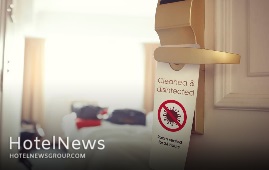
Hospitality, at its core, is an industry of people taking care of people, and has a long-standing commitment to cleanliness and service standards. While the housekeeping team is central in the delivery of those standards, it operates in the background, out of view. Room attendants and supervisors moved around discreetly to be as invisible as possible. However, COVID-19 has thrust housekeeping into the limelight. As COVID has led to a surge in public health awareness, hotels are now put in a position of making their commitment to cleanliness part of their guest experience. Rethinking operations, and re-designing housekeeping operations using technology is the only way to achieve the productivity and quality that is required. At Knowcross, we focus on three central housekeeping areas: staff productivity, cleaning quality, and guest experience. We have moved swiftly to enhance our products to adapt to the negative impact COVID-19 has had on each of these areas. The unpredictability of the virus means that your hotel must be vigilant in its adherence to new health and safety protocols. Your housekeeping technology has a critical role here and it serves several purposes. First, it underlines that health and safety should always be top of mind every day and that your hotel fosters a culture of accountability. Secondly, health checks and associated reporting help support contact tracing in the event there is a positive test amongst the team. Quicker containment means that the hotel itself can be protected from shutdown and, most importantly, your staff stays safe. Lastly, health checks communicate to your staff that you are looking out for one another. New Cleaning Protocols Hospitality industry was quick to roll out an extensive list of cleaning and safety protocols after COVID-19 erupted. Housekeeping operations must support changes such as the elimination of high-touch items in guest rooms, dedicated ‘cleanliness’ teams and the intensive sanitisation of common areas and guest rooms. All of these changes impact staffing assignments and cleaning times, which have a direct impact on guest experience. The truth is that most hotels, unfortunately, have had to let staff go, resulting in more work for the remaining people. Your housekeeping software must include the configurability to support these variations without adding manual management time. For example, when creating housekeeping tasks, you may now need to a “sanitation > full cleaning > inspection > sanitize & seal” cycle to prepare a departure room for a new arrival. Your system should support this new task structure while also accounting for the time and labor requirements. At Knowcross, we’ve done this with a fully automated system called Dynamic Task Sheets that eliminate the need for a central coordinator in housekeeping to constant- ly create task sheets and juggle staff and rooms among them. In some geographic areas, we have witnessed rules pertaining to a limited percent- age of rooms in active rotation, with accompanying cleaning cycles. Once again, your housekeeping operations software should make the rotation and sanitation of room blocks simple, with few manual adjustments. Conclusion New housekeeping technology enhancements have kept up with changing COVID-19 requirements, but it must be remembered that those hotels with housekeeping management automation solutions were already enjoying the labor efficiencies that are now so sought after across the industry. Whether it’s using PMS data to map cleaning schedules, instantly communicating room status, or providing mobile at-a-glance guest histories, technology can improve productivity and accuracy of housekeeping departments – a must-have in the post COVID world. I have no doubt that intelligent, data-driven housekeeping operations will soon become the norm and hotels will find new, innovative ways to deliver superior guest experiences that today’s travelers yearn for more than ever.
Create: Jun 20, 2021 Edit: Jun 20, 2021 Housekeeping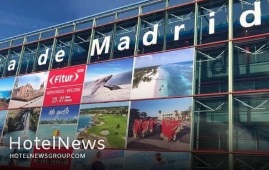
A select of Iranian travel-associated businesses and tour operators will promote handicrafts, traditions, and tourism potentials of the country at the 42nd FITUR tourism trade fair, which will be held in Madrid, Spain, from January 19 to 23, 2022. The Touring & Automobile Club of the Islamic Republic of Iran (TACI) as the representative of the Ministry of Cultural Heritage, Tourism and Handicrafts will be organizing Iran paravian at the tourism trade show, Mehr reported. A variety of exhibits, live performances, meetings, and workshops are amongst lineups of the Iranian exhibitors at FITUR 2022, which connects the industry with the inbound and outbound international markets. After hosting a post-pandemic recovery edition in the Spring of 2021, FITUR Madrid 2022 will resume its regular appointments at the beginning of the year, taking place at IFEMA – Feria de Madrid. Over the five days of the international tourism fair, professional participants will have access to unmissable commercial and business activities. In addition to being able to present their offers directly to the end customer, exhibitors can meet with over 150,000 trade visitors with significant purchasing power, according to organizers.
Create: Jun 19, 2021 Edit: Jun 19, 2021 Regional News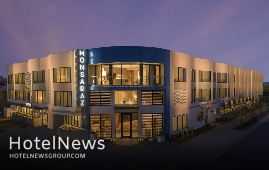
Today Point Loma welcomed its first new hotel in over a decade with the grand opening of The Monsaraz San Diego, Tapestry Collection by Hilton. Developed by Lamming Co. in partnership with Alliance Development, KNA Design, R&R Construction and JWDA architects, The Monsaraz celebrates Point Loma, often referred to as the place “where California began,” through its design, amenities and guest experience, offering a sea-centric haven—and an escape from day-to-day life—in the heart of one of San Diego’s iconic coastal towns. “We developed The Monsaraz with one goal in mind: ‘Create a place that enables our guests, their visitors, friend and the community to awaken their senses, be inspired to live in the moment and take time for a luxurious pause—an immersive experience that allows them to try something new, to relax, enjoy and celebrate one another.’” said Cameron Lamming, founder of Lamming Co. “We hope The Monsaraz leaves a welcoming legacy for Pt. Loma and San Diego, a legacy that brings together travelers from around the world and all walks of life in shared experience,” he said. The boutique hotel, designed to create an immersive and welcoming ecosystem with an evocative and effortless use of hand-hewn materials, custom handcrafted tiles, mid-century modern furniture and inspiring art features, features 92 guest rooms, including three suites, with distinct views of the rolling hills of Point Loma, the Bay and the Downtown skyline. The hotel’s design story stems from a story about young lovers meeting in Portugal for a magical weekend, and departing to go their separate ways, with a memory of the adventure and a new outlook on life to take back to their own homes. With that story in mind, hallways lead guests on an art-lined journey to the elegant and approachable comfort of each guest room, which feature bedrooms accented with blues that range from soft -to vibrant, grays and pops of wood. Reflecting the ever-changing nature of work-meets-play, mobile desks in all guest rooms make for a customized work and leisure experience; bathrooms feature blue ceramic patterned tile, inspired by classic Portuguese styles, with oversized walk-in showers and standout vanities. Guests and locals are invited to gather and connect in common spaces, including the hotel’s centerpiece: a 4,000 square-foot open-air courtyard accented by an enchanting live tree, locally painted and designed mural and living plant wall—the ideal destination for cocktails by the fire, weekend workouts, live music, art installations, pop-up cooking classes that enable local chefs showcase their talents, and Sunday “Fun-days” of all kinds. The courtyard is purpose-built—with a goal to create an inclusive atmosphere that fosters the curation of ideas, inspires new friendships and connections—and even helps make the world a better place. Guests may also find their way to The Monsaraz’s third floor “Hideaway”—the perfect place to take in the San Diego sunset with a cocktail in-hand. The Monsaraz is also home to Westerly Public House, a 60-seat Cali-Aussie concept that will showcase coastal cuisine inspired by both Aussie and SoCal beach culture. Westerly Public House’s menu embodies the coastal lifestyle with a strong focus on sustainability and locally sourced ingredients, with signature dishes including Mushroom Toasties, fish and chips, and peri peri chicken, plus a selection of classic, quintessentially “California” favorites and a dynamic wine and cocktail list. As part of the Tapestry Collection, The Monsaraz has implemented Hilton’s globally recognized CleanStay program. Hilton, in collaboration with RB, maker of Lysol and Dettol, and in consultation with Mayo Clinic, has launched an industry-defining standard of cleanliness and disinfection called Hilton CleanStay. In a first for the hospitality business, Hilton CleanStay is a rigorous system that incorporates RB’s trusted know-how and scientific approach to cleaning practices and product offerings. Experts from Mayo Clinic’s Infection Prevention and Control team are enhancing Hilton’s cleaning and disinfection protocols. Hilton CleanStay builds upon the already high standards of housekeeping and hygiene at Hilton’s more than 6,300 properties worldwide, where hospital-grade cleaning products and upgraded protocols are currently in use. The goal is to provide guests with assurance and peace of mind. The initiative creates a focus on cleanliness that is visible to guests throughout their entire stay – in their guest rooms, restaurants, fitness rooms and in other public spaces. Specific policies and procedures for The Monsaraz can be viewed online at TheMonsaraz.com. Reservations can also be booked online at a limited time opening best available rate starting at $180 per night.
Create: Jun 13, 2021 Edit: Jun 13, 2021 International News
When are groups coming back? This is undoubtedly a question on many hoteliers’ minds, but perhaps the better question is, how are you going to manage operations when they do come back? Right now, the industry is narrowly focused on two central issues – the post-pandemic surge in leisure guests (as epitomized by the concept of ‘revenge travel’) and the labor shortages resulting from so many furloughed staffers permanently leaving the industry (amongst other factors). Both of these matters not only influence the groups segment, but also compound many of their underlying problems. To help navigate the impact of these two issues to realize big revenue gains from the upcoming return of groups, we recruited Steve Anevski, CEO and Co-Founder of Upshift (www.upshift.work), an on-demand staffing platform with the backing of Recruit Holidings (parent company of Indeed). The company has experienced tremendous growth in the past two quarters, particularly as Upshift’s ability to properly vet then deliver high quality shift workers gives hotels the assurance they need to effectively facilitate events once more Revenge Travel for Groups To the first of these concerns, the psychology of revenge travel, in combination with general stir-craziness and what’s dubbed ‘mortality salience’, will compel a tremendous swarm of newly confident leisure guests to venture forth come Q3 2021 based on current vaccination rates and governmental decrees. As we discussed with Anevski, these same compulsions, however, will invariably lead to a swell in groups, albeit following a different pattern than what comprised group travel in 2019. While we can all look enviously at the sold-out rock concerts and rugby matches in Australia, the large-scale, international MICE happenings of yesteryear will take some time to properly come back for the rest of the world. Yet right now, discussions amongst friends of colleagues are already taking place along the lines of, “Hey, we’re all vaccinated now and they’re saying it’s safe to gather in small groups, so let’s start planning something for this fall because we all haven’t seen each other in a long time.” This may not yet be revealed by travel search inquiries or, say, a year-over-year increase in total RFPs for a given territory, but we can nevertheless infer how groups will return. In lieu of conventions, companywide town halls and 200-or-more attendee receptions, think intimate weddings, family reunions, hub-and-spoke hybrid meetings and senior level-only corporate retreats. Importantly, because of the spontaneousness that underpins revenge travel, these smaller group bookings will have vastly shorter lead times from inquiry and contract to actual event date.Managing the Nightmare of Upcoming Events So, let’s list off all the problems that a hotel may encounter in trying to rebuild its group segment in Q3 and Q4 2021: Smaller groups, meaning more management time required to negotiate all of these at the same time then juggle room blocks and coordinate all specific requirements Dire shortages of shift-based labor caused in large part by people leaving the industry as a direct result of the pandemi Drastically shorter lead times for event bookings as groups opt to rush back with something in the near-term and release that pent-up demand New SOPs related to COVID-19 safety, compounding each group’s specific requirements and mandating more team training Inability to bring back many full-time, fixed-cost employees due to the increased carrying debt from a disastrous 2020, the still-depressed revenue on the books and an inability to accurately forecast the shape of an individual hotel’s occupancy recovery Together, these five factors can make hosting an event a nightmare to effectively render (and create a slew of financial headaches if an event isn’t rendered properly) or outright untenable for some properties. To respond to these market conditions, hotels must remain nimble and recruit labor on an as-needed basis much like how revenue managers yield rates in the face of compression. Labor Tech to the Rescue Maintaining a mostly variable labor force in name of being able to accept group bookings creates a critical problem in terms of how to source and motivate these shift workers. That’s where new-age platforms like Upshift come in, where many veteran banquet workers, as Anevski pointed out, have already signed up so that they are more visible and available for hire on-demand. For 2019 and earlier, variable labor demands were addressed by temp agencies. Like so many other aspects of business, though, the pandemic has brought to light the inherent fallacies of these third parties. Notably, temp accountability was always suscept; hotels would receive workers of questionable training and demeanor, and without the ability to validate quality ahead of a given shift. Often, properties would get temps arriving late, entering the FOH entrance instead of BOH, wearing the incorrect uniform, showing up ‘under the weather’ or failing to review the necessary instructions prior to the start of a shift. With the pandemic acting as a proverbial gun to hoteliers’ heads towards the adoption of new platforms to help build a contactless and more personalized guest experience, the legacy issue of putting up with the inadequacies of temp agencies can likewise be solved through a deeper reliance on technology. First is the ability to better manage labor for the coming groups surge and the issue shorter lead times by giving a hotel immediate access to a larger pool of possible hires. Concurrent to this, HR departments would get a palpable productivity boost by using an online portal instead of the old school, paper-and-pen method. Above all, the benefit worth reemphasizing is the heightened accountability. For example, Upshift goes about this through a meticulous prescreening and background check process, combined with a third-strike policy of banning any temp for life from the app should they receive negative feedback three times from a hotel employer. The talent that we have found through Upshift has been outstanding, and it has really allowed us to be proactive as demand continues to shift,” said Chris Cano, General Manager for Columbia Sussex Management. “The transparency, flexibility and financial control I gain through the platform is unique and has been instrumental in controlling costs as we rebound from 2020.” Despite the narrowing of lead times that hotels may see for upcoming groups, the rule still applies that meetings and events are most likely to be initiated internally by planners a full quarter ahead of the desired date. As such, the time to start aligning your property with a wholly digital method of streamlining your temp workers is now. Just as the time to realign operations in advance of the leisure travel surge was this past winter, consider how you plan to pivot for the return of groups later this year. In this sense, using an on-demand labor platform like Upshift will help you to more effectively service any events you get as well as give your team more confidence in its ability to manage groups to help you win more business in the first place.
Create: Jun 13, 2021 Edit: Jun 13, 2021 Waiter
Hospitality is built on the development and nurturing of personal relationships, extending beyond interactions with guests to include other hoteliers and even vendor partners. Hotel and resort owners and operators know that it’s not always enough to deliver positive results to customers, sometimes it’s more important to develop a connection with guests when providing service. This mentality can be a challenge for technology partners who have been conditioned by other industries to deliver results without emotion. However, company culture defines the way partners work together, and technology companies can learn a great deal from hospitality’s service-driven ethos. One thing hotel technology partners must be mindful of is the increasing complexity of software used throughout the industry. They should remain patient with operators who are stepping outside of their comfort zones to use technology they are unfamiliar with. Furthermore, many independent chains and boutique hotel groups operate without the benefit of an internal IT department, and for them, it is crucial that the technology supplier be a partner they can rely on to help solve problems in a collaborative and solution based approach. Here are four culture attributes a PMS company must possess to help ensure your hotel’s success: Be AdaptableThe service-oriented nature of hospitality creates an environment where many small-scale changes are taking place industrywide, from adapting to new guest booking patterns to creating new avenues for communication with travelers. In an environment like this, it is important for vendors to be open to receiving constructive criticism to improve service and make the most of current market conditions. Conducting business in the service arena requires some degree of humility, and sometimes well-intentioned efforts can backfire due to the way they were delivered, or other unforeseen factors. Receiving free feedback can be invaluable, whether it comes from an industry consultant or your hotel partners. Opening your offerings up to occasional scrutiny from those who use them every day can help provide inspiration to improve your products and services going forward, and even more effectively navigate your chosen business segment. Be AccessibleTech partners will always struggle with visibility due to the nature of the space they operate in, so it may be necessary to find ways to “walk the floor” with your customers the same way hotel GMs do. Since contact with hotel partners occurs most often when things have gone awry, the most efficient answer to this concern is for tech providers to make it easier for hoteliers to reach them. Direct text chat has seen runaway growth in popularity since the beginning of the pandemic, and it provides several benefits as a means of communication between hotels and tech partners. For one, tech chat allows users to be more deliberate with their messaging, reducing confusion in the long run. Additionally, all communications over text can be easily recorded and shared, helping with future technical issues and assisting with troubleshooting. Lastly, it is the ideal method for sharing e-learning materials, as users can retain them for long-term reference. Be ResourcefulKnowing your customer is everything, so why not consider hiring former hospitality workers for training and support roles? Your technical support personnel are more likely to help resolve customer issues in a reasonable manner if they walked a mile in their shoes. The hotel industry is currently going through a labor crisis, and it is important to make an immediate connection with hotel partners. Former revenue managers, salespeople, and GMs are perfect for these positions as they are fluent in hospitality lingo and already possess the service mindset to help other hoteliers find the solutions to their problems. Hospitality and technology are continually becoming intertwined, and connections such as these will be necessary to sustain future success as the level of complexity in a hotel’s day-to-day business continues to increase. Be HospitableHospitality employees are typically friendly, outgoing, likeable people. Many of them were attracted to hospitality for its focus on people, and the desire to provide a high-quality experience. They love solving problems and making others’ lives easier. Technology providers should strive for the same qualities in our own offerings. If, culturally, your organization’s people are pushing to do a better job every day to better serve customers, and go above and beyond when the opportunity presents itself, they are in the right place.
Create: Jun 9, 2021 Edit: Jun 9, 2021 Hotel Management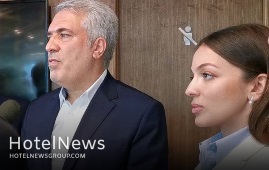
Iranian Minister of Cultural Heritage, Tourism and Handicrafts, and Head of Russian Federal Agency for Tourism emphasized tourism development between the two countries to remove possible barriers for the tourists. At a meeting on Monday, the two sides called to implementation of tourism agreements between the two countries as soon as possible and remove possible barriers to the tourists from the two countries. Mounesan said: "Facilitating the movement of tourists has been one of the important policies of Iran to calculate the income from it in GDP." Mounesan emphasized Iran moved from historical and cultural tourism to ecotourism because Iran also has eye-catching natural beauties in addition to historical and cultural attractions. The Minister said: "We launched ecotourism and rural and agriculture tourism, and the target countries were also identified. Before Corona, we had 10 million tourists from Iran, 65,000 of whom traveled to Russia. Zarina Doguzova, the head of the Russian Federal Agency for Tourism, also said that it is necessary to increase tourists to the two countries due to the warm relations between the two countries and the excellent tourism capacities. Iranian Minister of Cultural Heritage, Tourism and Handicrafts Ali Asghar Mounesan arrived in Moscow on Sunday to sign a deal on lifting individual visa requirements for tourist groups, Iran’s Ambassador to Russia Kazem Jalali wrote on his Facebook page on Sunday. "Today, Minister of Cultural Heritage, Tourism and Handicrafts Ali Asghar Mounesan is arriving in Moscow to sign an agreement on lifting visa requirements for tourist groups," the ambassador wrote. According to the diplomat, under the deal, tourists of both countries will be able to travel to Iran and Russia through accredited companies, and the entire group will receive one visa. Jalali stressed that tourism is a foundation for developing Iranian-Russian ties.
Create: Jun 8, 2021 Edit: Jun 8, 2021 Regional News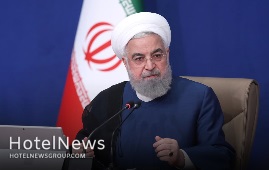
Iranian President Hassan Rouhani inaugurated several big cultural and tourism projects with 2,537 billion tomans of investment in different parts of the country Thursday. The inauguration ceremony was held through a video conference based in Tehran. The projects which are located in north and west of the country will provide employment for 2,697 people. A five star hotel in the gracious landscape of Heiran as well as renovation project of Amjad palace in Talesh both located in the northern province of Gilan are among the projects inaugurated today. 33 Renovation projects together with two major tourism centers in western province of Lorestan were also officially opened by President Rouhani today. At the ceremony, the president appreciated good efforts made to boost tourism industry. Also, he hoped that tourism would enter new conditions after public vaccination slated for final months of the Iranian calendar year which started on March 21. At his remarks, the president referred to return of 2,723 Iranian historical works and antiques from US and Europe to the country during past eight years. As he stressed, such return was kind of fulfillment of the Iranian people's rights. Every week, the president opens several important projects on petrochemicals, oil, industry, tourism, sports, infrastructure, development and health to follow goals behind "Surge in Production" which is the name of the past Iranian year (March 20, 2020- March 20, 2021) declared by the Supreme Leader.
Create: May 28, 2021 Edit: May 28, 2021 Regional News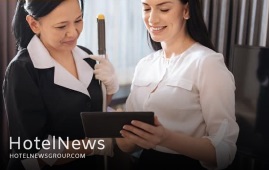
HNI, [۲۶.۰۵.۲۱ ۱۱:۴۱]Hotel technology exists to amplify, not burden, a hotel’s guest experience. Truly guest-centric technology should empower hoteliers to deliver their unique and ideal version of the guest experience. But great hotel technology should not only be guest-focused, it must also be management-focused, by helping hotels scale their business, and staff focused by facilitating operations, streamlining communications, and promoting employee productivity. In the face of a post-pandemic labor crunch, hotels need a mobile and guest-centric PMS to support a lean staff as they look to meet an uptick in travel demand. 2021 Will See the Hospitality Industry Roaring Back… But Hiring Still Lags BehindThe COVID-19 pandemic was devastating for hospitality, setting the industry back over 10 years in terms of occupancy and job losses. According to the ALHA, the pandemic cost the U.S. hospitality industry over 50% occupancy, and over 3.1 million jobs. The good news, however, is that the industry is on the verge of a major recovery. Rising vaccination rates, coupled with rapidly falling case numbers have led to an increase in confidence with the traveling public. According to Destination Analysts,confidence in travel safety is increasing, with over 61.8% of American respondents confident that the pandemic situation will continue to improve, and over 72% of the respondents making travel plans in the previous week. This rising optimism is being seen in job reports indicating that the hospitality sector gained over 331,000 jobs in April 2021 一 the sixth largest gain in the past 50 years. Unfortunately, these gains may not be enough. U.S. hotels are still 600,000 workers short of pre-pandemic levels, but workers don’t seem to be filling the vacancies. This can be attributed to a number of factors, including widespread health concerns, difficulty obtaining childcare, and the recent rise in federal unemployment benefits. The question for hotels is how can they leverage technology to support a lean staff, get new staff up to speed quickly, and help their current employees better engage with and serve their guests, without the burden of physical or technological constraints. PMS Technology Should be Intuitive, Mobile, and Unburden StaffHoteliers joined the hospitality industry because they delight in serving their guests 一 not because they wanted to fight with outdated technology. If hotels want to retain high-performing employees, they should invest in technology that actively empowers them to deliver an exceptional guest experience. What does it mean to have a staff-focused PMS? On the most basic level, PMS platforms should be intuitive and easy to use, and never burden employees when serving their guests. When technology is delivered through an intuitive user interface, hoteliers can spend less time buried in their screens, and more time actively engaging with their guests. Additionally, mobile & guest-centric PMS technology should promote maximum ease of access. Hoteliers should be able to manage their property from any location and device, giving them the freedom to move about the hotel and meet guests wherever they are. This allows staff to have more natural and personalized interactions with their guests, while also freeing any staff member, no matter their specific job title, to help any guest in any section of the hotel. Easy-to-Train On Systems Enable Hotels to Expand their Talent PoolPMS platforms should be easy to train on and easy to master. When technology is easier to understand, hotels can hire staff based on how they actually interact with guests 一 not how well they “get” outdated technology. When a new staff member is hired, it should be easier to train and onboard them to the new technology, thereby increasing adoption throughout your team. HNI, [۲۶.۰۵.۲۱ ۱۱:۴۱]When investing in new PMS technology, hoteliers should also explore what resources the vendor offers in terms of staff training and support. The right PMS technology vendor will view its relationship with its clients as a long-term strategic partnership, and will make sure its clients’ staff have the resources they need to get the most out of their product. Look for a dedicated implementation team, with the option for either in-person or remote implementation, as well as a dedicated client success manager (CSM), who can act as the customer’s voice within the organization. The right PMS vendor will provide robust self-training resources, including a comprehensive product knowledge base, on-demand e-learning courses, and best practice materials which demonstrate how to use the product to enhance the guest journey and operational efficiencies. Mobile Communication Can Streamline Operations and Improve Staff MoraleBreakdowns in team communication can easily lead to breakdowns in team morale. When hoteliers communicate with walkie-talkies and landline telephones, critical information can get lost in the shuffle, resulting in dissatisfied guests and frayed team dynamics. A mobile, guest-centric PMS can streamline staff and guest communications in a number of ways: Instant room updates automatically notify front desk staff when a room is ready or out of order, while analytic dashboards can keep your entire staff updated on key performance metrics. For more sophisticated forms of communication, native-cloud PMS systems can integrate with third-party guest messenger platforms. Guest messaging delivers seamless communication throughout the guest journey using common messaging platforms such as SMS, Facebook Messenger or WeChat. This allows guests to communicate instantly with staff through their mobile device, while also allowing staff members to serve multiple guests through multiple chat windows. Use Advanced Automation to Get the Most Out of a Limited Staf The hospitality industry is facing increased travel demand and heightened expectations for cleanliness and service, as it moves into the peak 2021 summer travel season. Unfortunately, they are still hampered by limitations in resources and staff size. By incorporating robust automation, a mobile PMS can help hotels get the most out of limited staff, while also freeing hoteliers from many of the mundane, repetitive tasks that take them away from their guests. A native-cloud PMS can automate simple but repetitive tasks such as room assignment, bulk check-in, and housekeeping task management. But it can also automate more advanced processes 一 like the entire check-in experience. Guests can have the option of checking in through their mobile device or a guest-facing smart kiosk. Mobile self check-in can not only streamline and personalize the check-in experience for guests, it can free hotel staff from engaging in repetitive and scripted dialogues during the check-in process. This self check-in option can also include automated targeted offers for amenities and room upgrades, giving the hotel an additional stream of ancillary revenue. Instead, they can focus on more natural and personalized interactions, like answering questions about dining options, or greeting guests with tea or champagne in the lobby. Great Technology Should Empower Great HoteliersIn order to succeed in the post-pandemic hospitality market, hotels have to deliver exceptional and personalized service on a limited staff. Therefore, it’s crucial that they invest in technology which is not only guest-centric but staff-centric as well. A mobile, guest-centric PMS delivers on both of these goals, by leveraging a system that is easy to use and easy to learn, while facilitating both staff communication and streamlined operations. Great technology should empower both hoteliers and their employees to deliver the best guest experience possible. And a guest-centric PMS can help them do just that.
Create: May 26, 2021 Edit: May 26, 2021 Hotel Management
